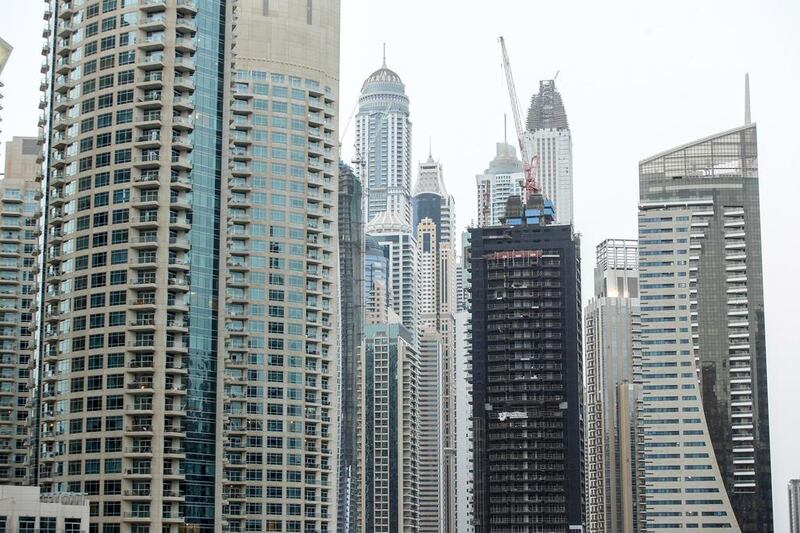I want to buy an apartment in Dubai for Dh1.75 million but only have just over half of the Dh437,500 deposit I need saved up. Can I take out a personal loan to fund the other Dh200,000 I need? RB, Abu Dhabi
Expert 1: Brendan Kennelly, senior mortgage consultant at mortgagefinder.ae
It’s exciting that you’re considering homeownership in Dubai, but I’d like to give you some background on the mortgage industry here so you can make a more informed decision. Four years ago, the UAE issued some new regulations on mortgage lending. One of the aims is to prevent a would-be homebuyer from taking out a personal loan for a down payment. The regulations, from the UAE’s Central Bank, exist to make sure that banks and financing companies providing mortgage loans are in accordance with best practices, and have control frameworks in place. Under Central bank laws, no more than 50 per cent of your total income should be committed to paying off your debts, including mortgage payments, credit cards, or other loans.
In your situation, if you have approximately Dh220,000 for a down payment, this would give you a budget to buy a property - with a mortgage - for around Dh900,000. In addition to the 25 per cent deposit, there is the Dubai Land Department, real estate agent and bank fees to consider which amount to an additional 7 per cent of the purchase price (although some of these can be financed by being added to the mortgage, or to a separate personal loan). If you have assets (properties, cars, etc), or other investments in the UAE or overseas, these could be sold to add to your overall cash contribution. I have had clients sell properties in their home countries, sell their car in the UAE, or receive cash from their parents to pull together a down payment for property here. I’m not necessarily recommending this, and you should consider this carefully as currency exchange risk needs to be considered, as well as potential break costs on any investments.
The most straightforward plan, while not the most exciting, would be to save the additional cash until you’ve reached your target down payment. I’d recommend speaking to a mortgage adviser that can assess your profile in full and provide suitable mortgage options. Good luck.
___________
Read more:
Money Clinic: How do I know which new car deal is best in the UAE?
Money Clinic: The secret to becoming a millionaire
___________
Expert 2: Sawan Karia, managing director of Home Matters
Using a personal loan to subsidise a down payment or deposit is not permitted under current UAE Central Bank Mortgage Regulations. These regulations came into effect on December 28 2013 and were designed to protect consumers and lenders from over-exposing borrowers and avoiding another property market bubble. Short-term lending through personal loans was far from an ideal solution before the regulations came in. The maximum personal loan term is 48 months and as these loans are unsecured, interest rates are significantly higher than mortgage rates.
The Al Etihad Credit Bureau was also introduced a couple of years ago and was recently enhanced to provide a credit scoring system. The bureau is being used by all banks and lenders to record all mortgage, personal, car and company loans, as well as all credit card facilities and overdrafts. This means consumers cannot source a personal loan from one bank, while simultaneously applying for a mortgage with another lender. If any consumer is being advised to do this, they should not do so, as this practice can result in serious consequences. One or both loan providers could potentially retract the loan offer at the last minute, if and when becoming aware of the other facility. This can result in buyers losing deposits on property if they are later unable to meet the funding requirements.
This is not necessarily the end of the road for a buyer with a deposit shortfall. There are alternatives available, including leverage against existing property or buying under construction units via payment plans. If a borrower has existing property in the UAE or UK, for example, with little or no mortgage, it may be possible to borrow the shortfall or deposit against the existing property, subject to UAE Central Bank maximum affordability limits. As an example, if an expat buyer has a Springs property worth Dh2m with no mortgage, they can potentially borrow up to 75 per cent (Dh1.5m) of the value of this property and use the equity released cash as a down payment against a new property. The new property can also be mortgaged up to 60 per cent loan to value. This means the buyer can purchase a property up to a maximum value of Dh3.75m by using two mortgages (Dh1.5m against Springs and Dh2.25m mortgage on the new property), subject to affordability. This would only require the buyer to fund the fees.
Buying an under construction unit is also an option. However, buyers must be aware that buying off-plan or under construction is a higher risk strategy than purchasing a completed unit, due to potential of delays in handover, changes in the buyer’s future financial situation and having to pay rent whilst the unit is not habitable.
Next question:
My two children have finished their higher education and are now in their first jobs. Yet they still constantly ask for handouts to pay for flights home, bills, rent etc. How can I stop being the family ATM? WK, Dubai
Every two weeks The National features a reader's personal finance problem. If you have an issue or want to suggest a solution for another reader's concern, write to pf@thenational.ae






